Overview
In a second term marked by a series of controversies and little legislative success, President Obama’s job approval rating has nonetheless remained fairly steady. Currently, 49% approve of the way Obama is handling his

job as president while 43% disapprove.
That is little changed from a month ago, before the NSA surveillance controversy and the revelations that the IRS targeted conservative groups for extra scrutiny. In early May, 51% approved of Obama’s job performance while 43% disapproved.
In fact, Obama’s current job rating has stayed at about 50% all year. He began the year with a 52% job approval mark, which fell to 47% in March, when the public’s economic expectations took a sharp turn for the worse.
The latest national survey by the Pew Research Center, conducted June 12-16 among 1,512 adults, finds that Obama is likely benefitting from more positive perceptions of the national economy.
The share of Americans saying the economy is in excellent or good shape has doubled over the past year, from 11% to 23%, and is the highest measure since January 2008. Looking ahead, more say the economy will be better (33%) than worse (19%) a year from now. That is a reversal of economic expectations since March, when more said economic conditions would be worse (32%) than better (25%) in a year.
Yet the public’s economic

views look good only when compared with the dismal attitudes of the past five years. Take evaluations of local job availability: 29% now say that there are plenty of jobs available in their community, the most positive measure since July 2008. Roughly twice as many (64%) say that jobs are difficult to find.
Obama’s ratings on the economy, while mixed, also have improved. Currently, 44% approve of his handling of the economy

while 50% disapprove. That is among Obama’s highest net approval ratings on the economy since his first year in office. Yet it is well below the 60% approval rating Obama received for handling the economy in April 2009.
The public remains divided over whether Obama’s policies have made economic conditions better or worse (35% each); 27% say that his policies have had no effect so far. These opinions are little changed over the past year-and-a-half, but in the fall of 2011, nearly twice as many said his policies had made things worse (38%) than better (20%).
Opinions about Obama’s legacy, like views of the impact of his economic policies, are divided. About a third (34%) say that, in the long
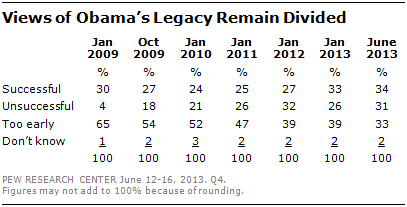
run, Obama will be a successful president; similar percentages say he will be unsuccessful (31%) or that is too early to tell (33%). Even as an increasing share has offered a judgment about Obama’s legacy, the balance of opinion has changed only modestly.

The survey finds that the one-word impressions people have of Obama have changed a great deal throughout his presidency. Terms like incompetent and liar now are among the most frequently used words to describe Obama. In April 2009, when his job approval was at 63%, these words were rare.
Some positive descriptions – such as good and honest – continue to be used often to characterize impressions of Obama. And the word socialist is used about as often today as it was in Obama’s first year in office.
Obama’s Job Rating Higher than Bush’s, Lower than Clinton’s
Obama’s current job rating of 49% is higher than George W. Bush’s rating in June 2005 (42%), but lower than Bill Clinton’s job measure in June 1997 (54%).

The partisan divide in opinions about Obama’s performance is virtually the mirror image of views of Bush at a comparable point in his second term. Currently, 85% of Democrats approve of the way Obama is handling his job as president, compared with just 16% of Republicans. (See the table at the end of this report for a detailed look at Obama job approval.)
In June 2005, 85% of Republicans and 14% of Democrats viewed Bush’s job performance positively. Obama’s rating among independents is higher than Bush’s eight years ago (41% vs. 32%).
Clinton’s job rating in June 1997 was less polarized: 79% of Democrats, 29% of Republicans and a narrow majority of independents (53%) approved of the way he was handling his job as president.
Obama and the Issues
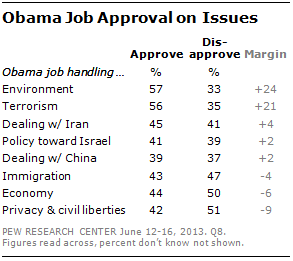
Despite the public’s mixed views of the government’s collection of telephone and internet data as part of anti-terrorism efforts, Obama continues to get positive marks from the public for his handling of the threat of terrorism – by a 21-point margin (56% vs. 35%) more approve than disapprove.
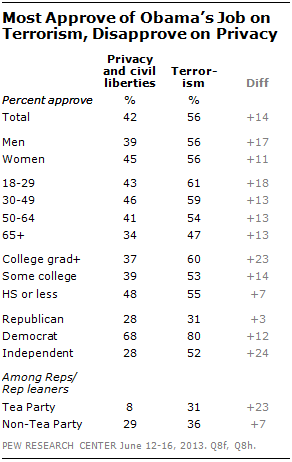
Yet Obama receives some of his worst marks for how he is handling privacy and civil liberties: just 42% approve while 51% disapprove.
The gap in these two ratings is particularly wide among independents: just 28% approve of how Obama is handling privacy and civil liberties, compared with 52% who approve of his handling of terrorism. There is a smaller gap among Democrats (68% approve of how Obama is handling civil liberties, 80% terrorism). Republicans offer roughly the same ratings on both issues (28% approve of how Obama is handling civil liberties, 31% terrorism). These are among the strongest ratings Obama receives from Republicans across the eight issues tested.
By a 14-point margin, more Americans say that Obama’s terrorism policies have made the country safer from terrorism (36%) not less safe (22%). Another 38% say his policies have not made a difference.
More Positive Economic Views
Only about a quarter of Americans (23%) rate current economic
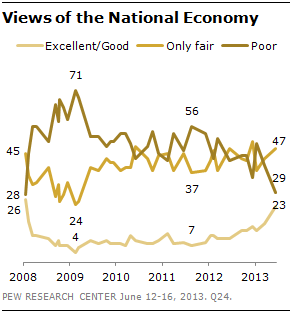
conditions as excellent or good, while 76% say they are only fair or poor. Yet this is the most positive assessment of the nation’s economy since January 2008.
While favorable assessments of economic conditions have risen gradually since last summer, the percentage rating the economy as “poor” has fallen more sharply. Currently, 29% say economic conditions are poor, down 11 points since March and 20 points since the start of the year.
The public’s economic outlook for the year ahead also has taken a positive turn since March. At that time, more said the economy would be worse in a year (32%) than better (25%); 41% said it would be just about the same. This marked the first time in Obama’s presidency when there was more economic pessimism than optimism.
Currently, 33% anticipate
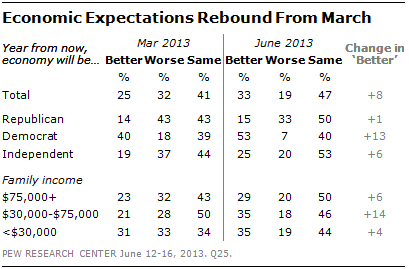
economic conditions being better a year from now, while 19% say they will be worse; about half (47%) expect little or no change. The current measure is more in line with economic expectations in January (33% better in a year, 25% worse, 40% about the same).
Democrats, in particular, have become more optimistic about the economy: 53% say they expect conditions to be better a year from now, up from 40% in March. Among independents, about as many say they expect the economy to improve (25%) as to get worse (20%); in March, about twice as many thought conditions would get worse than improve (37% vs. 19%). Even Republicans’ economic outlook is less negative, though the percentage saying they expect the economy to get better is little changed from March (14% then, 15% today).




